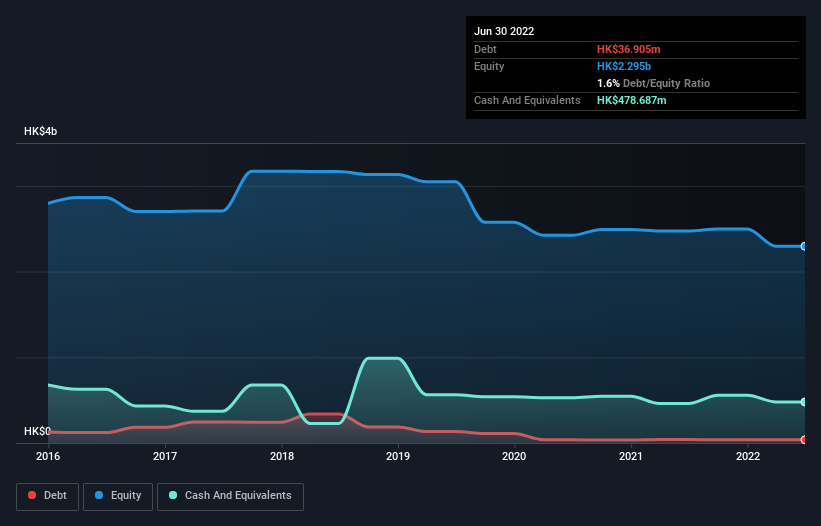- Hong Kong
- /
- Healthcare Services
- /
- SEHK:2389
Health Check: How Prudently Does Beijing Health (Holdings) (HKG:2389) Use Debt?

The external fund manager backed by Berkshire Hathaway's Charlie Munger, Li Lu, makes no bones about it when he says 'The biggest investment risk is not the volatility of prices, but whether you will suffer a permanent loss of capital.' When we think about how risky a company is, we always like to look at its use of debt, since debt overload can lead to ruin. As with many other companies Beijing Health (Holdings) Limited (HKG:2389) makes use of debt. But the real question is whether this debt is making the company risky.
What Risk Does Debt Bring?
Debt and other liabilities become risky for a business when it cannot easily fulfill those obligations, either with free cash flow or by raising capital at an attractive price. Part and parcel of capitalism is the process of 'creative destruction' where failed businesses are mercilessly liquidated by their bankers. However, a more frequent (but still costly) occurrence is where a company must issue shares at bargain-basement prices, permanently diluting shareholders, just to shore up its balance sheet. Of course, the upside of debt is that it often represents cheap capital, especially when it replaces dilution in a company with the ability to reinvest at high rates of return. The first step when considering a company's debt levels is to consider its cash and debt together.
Our analysis indicates that 2389 is potentially undervalued!
What Is Beijing Health (Holdings)'s Net Debt?
The image below, which you can click on for greater detail, shows that Beijing Health (Holdings) had debt of HK$36.9m at the end of June 2022, a reduction from HK$41.3m over a year. However, it does have HK$478.7m in cash offsetting this, leading to net cash of HK$441.8m.

How Healthy Is Beijing Health (Holdings)'s Balance Sheet?
The latest balance sheet data shows that Beijing Health (Holdings) had liabilities of HK$216.9m due within a year, and liabilities of HK$87.0m falling due after that. Offsetting these obligations, it had cash of HK$478.7m as well as receivables valued at HK$42.4m due within 12 months. So it actually has HK$217.1m more liquid assets than total liabilities.
This luscious liquidity implies that Beijing Health (Holdings)'s balance sheet is sturdy like a giant sequoia tree. With this in mind one could posit that its balance sheet means the company is able to handle some adversity. Simply put, the fact that Beijing Health (Holdings) has more cash than debt is arguably a good indication that it can manage its debt safely. When analysing debt levels, the balance sheet is the obvious place to start. But it is Beijing Health (Holdings)'s earnings that will influence how the balance sheet holds up in the future. So when considering debt, it's definitely worth looking at the earnings trend. Click here for an interactive snapshot.
In the last year Beijing Health (Holdings) wasn't profitable at an EBIT level, but managed to grow its revenue by 32%, to HK$216m. Shareholders probably have their fingers crossed that it can grow its way to profits.
So How Risky Is Beijing Health (Holdings)?
Although Beijing Health (Holdings) had an earnings before interest and tax (EBIT) loss over the last twelve months, it generated positive free cash flow of HK$33m. So although it is loss-making, it doesn't seem to have too much near-term balance sheet risk, keeping in mind the net cash. Keeping in mind its 32% revenue growth over the last year, we think there's a decent chance the company is on track. We'd see further strong growth as an optimistic indication. The balance sheet is clearly the area to focus on when you are analysing debt. However, not all investment risk resides within the balance sheet - far from it. To that end, you should learn about the 2 warning signs we've spotted with Beijing Health (Holdings) (including 1 which is concerning) .
If you're interested in investing in businesses that can grow profits without the burden of debt, then check out this free list of growing businesses that have net cash on the balance sheet.
If you're looking to trade Beijing Health (Holdings), open an account with the lowest-cost platform trusted by professionals, Interactive Brokers.
With clients in over 200 countries and territories, and access to 160 markets, IBKR lets you trade stocks, options, futures, forex, bonds and funds from a single integrated account.
Enjoy no hidden fees, no account minimums, and FX conversion rates as low as 0.03%, far better than what most brokers offer.
Sponsored ContentValuation is complex, but we're here to simplify it.
Discover if Beijing Health (Holdings) might be undervalued or overvalued with our detailed analysis, featuring fair value estimates, potential risks, dividends, insider trades, and its financial condition.
Access Free AnalysisHave feedback on this article? Concerned about the content? Get in touch with us directly. Alternatively, email editorial-team (at) simplywallst.com.
This article by Simply Wall St is general in nature. We provide commentary based on historical data and analyst forecasts only using an unbiased methodology and our articles are not intended to be financial advice. It does not constitute a recommendation to buy or sell any stock, and does not take account of your objectives, or your financial situation. We aim to bring you long-term focused analysis driven by fundamental data. Note that our analysis may not factor in the latest price-sensitive company announcements or qualitative material. Simply Wall St has no position in any stocks mentioned.
About SEHK:2389
Beijing Health (Holdings)
An investment holding company, provides medical, health, and geriatric care related services and products in the People’s Republic of China.
Flawless balance sheet minimal.
Market Insights
Community Narratives



